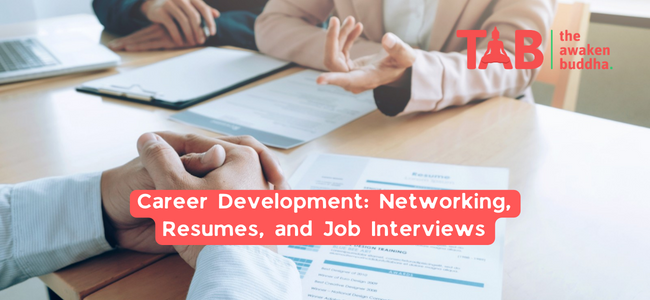As the job market becomes more competitive, having solid career development skills is crucial for success. This article will cover three critical areas of career development: networking, resumes, and job interviews. We’ll provide practical tips and insights to help you enhance your skills in these areas and improve your possibilities of landing your dream job.
Table of Contents
1. The Importance of Networking
2. Building a Strong Network
- Finding Opportunities to Network
- Attending Professional Events
- Utilizing Social Media
- Maintaining Your Network
3. Crafting an Effective Resume
- Understanding Your Audience
- Tailoring Your Resume to the Job Description
- Highlighting Your Achievements
- Formatting Your Resume for Maximum Impact
4. Preparing for a Successful Job Interview
- Researching the Company and Job
- Practicing Common Interview Questions
- Dressing Appropriately and Arriving on Time
- Demonstrating Confidence and Professionalism
1. The Importance of Networking
One of the most critical aspects of career development is networking. A strong network of contacts can open doors to new job opportunities, provide valuable industry insights, and help you stay connected to the latest trends and developments in your field.
2. Building a Strong Network
To build a strong network, you must proactively seek opportunities to connect with others in your industry. Here are some suggestions to assist you get started:
- Finding Opportunities to Network
1. Join professional organizations or associations related to your field.
2. Attend industry events like conferences, seminars, or workshops.
3. Volunteer for community organizations or causes that align with your interests or skills.
4. Connect with former colleagues or classmates on social media.
- Attending Professional Events
When attending professional events, it’s essential to be strategic in your approach. Here are some suggestions to assist you make the most of these opportunities:
1. Research the event and identify critical speakers or attendees you want to meet.
2. Prepare a brief introduction and some talking points ahead of time.
3. Bring business cards or other materials to share with new contacts.
4. Follow up with new contacts to maintain the relationship after the event.
- Utilizing Social Media
Social media platforms like LinkedIn can be powerful tools for networking. Here are some tips to assist you to leverage these platforms effectively:
1. Create a professional profile that highlights your skills and experience.
2. Connect with colleagues, classmates, and other industry professionals.
3. Join industry groups or forums to stay up-to-date on the latest news and trends.
4. Share industry-related content or insights to establish yourself as a reflection leader in your field.
- Maintaining Your Network
Finally, it’s essential to maintain your network by staying in touch with your contacts and nurturing those relationships over time. Here are some tips to assist you in doing so:
1. Set aside time weekly or monthly to connect with your network.
2. Share relevant news or updates with your contacts to stay top of mind.
3. Offer to help your contacts with their own career development goals.
4. Attend events or meetings with your network to strengthen in-person relationships.
3. Crafting an Effective Resume
Once you’ve established a strong network, the next step in career development is crafting an effective resume. Your resume is often the first impression you’ll make on a potential employer, so it’s essential to get it right. Here are some tips to assist you to create a resume that stands out:
- Understanding Your Audience
The first step in preparing an effective resume is understanding your audience. Who will be reading your resume, and what are they looking for? Take some time to explore the company and job you’re applying for so you can tailor your resume accordingly.
- Tailoring Your Resume to the Job Description
Once you understand your audience, the next step is tailoring your resume to the job description. This means highlighting the skills and experiences most relevant to the position you’re applying for. Here are some tips to assist you do so:
1. Use keywords from the job description in your resume.
2. Emphasize your relevant experience and achievements.
3. Include specific metrics or numbers to demonstrate your impact.
4. Customize your resume for each job application.
- Highlighting Your Achievements

Your resume should highlight your achievements and demonstrate how you’ve contributed value to your previous employers. Here are some tips to assist you do so:
1. Use bullet points to break up your resume and make it easier to read.
2. Focus on accomplishments, not just responsibilities.
3. Quantify your achievements with specific metrics or numbers.
4. Use active verbs to describe your contributions.
- Formatting Your Resume for Maximum Impact
Finally, formatting your resume for maximum impact can help you stand out. Here are some tips to help you format your resume effectively:
1. Use a clean, professional layout.
2. Use easy-to-read fonts and avoid using too many colors or graphics.
3. Keep your resume to one or two pages.
4. Use white space to break up sections and make your resume easier to read.
4. Preparing for a Successful Job Interview

Once you’ve crafted an effective resume, the next step in career development is preparing for a successful job interview. Here are some tips to help you ace your next interview:
- Researching the Company and Job
Before your interview, take some time to research the company and job you’re applying for. Here are some things to look for:
1. Company culture and values.
2. Recent news or developments related to the company.
3. The specific job requirements and responsibilities.
- Practicing Common Interview Questions
Practicing common interview questions can help you feel more confident and prepared during your interview. Here are some questions to practice:
1. “Tell me about yourself.”
2. “Why are you interested in this job?”
3. “What are your strengths and weaknesses?”
4. “Why should we hire you?”
- Dressing Appropriately and Arriving on Time
First impressions matter, so it’s essential to dress appropriately and arrive on time for your interview. Here are some tips:
1. Dress professionally in business attire.
2. Arrive 10-15 minutes early to allow time for unexpected delays.
3. Bring a copy of your resume and any other materials you may need.
- Demonstrating Confidence and Professionalism
During your interview, it’s essential to demonstrate confidence and professionalism. Here are some tips to assist you in doing so:
1. Make eye contact and use confident body language.
2. Speak clearly and concisely.
3. Highlight your relevant experience and achievements.
4. Ask thoughtful questions about the company and job.
Conclusion
Career development is an ongoing process that requires continuous improvement and the development of critical skills. By focusing on networking, resume crafting, and job interview preparation, you can improve your chances of landing your dream job and achieving your career goals.
FAQs
1. What is the best way to network with people in my industry?
The best way to network with people in your industry is to attend industry events, conferences, and seminars, join professional associations, and participate in online forums and social media groups related to your field. Building genuine relationships with others in your industry can assist you in staying up-to-date with industry trends and opportunities, gaining new insights and knowledge, and potentially opening doors to new career opportunities.
2. Should I include a summary or objective statement on my resume?
Whether to include a overview or objective statement on your resume depends on your preference and the specific job requirements you’re applying for. A summary statement can highlight your critical skills and achievements. In contrast, an objective statement can help clarify your career goals and show how they align with the position you’re applying for. However, some hiring managers may prefer a more concise and straightforward resume without these statements. Ultimately, deciding to include a summary or objective statement is up to you, but ensure it adds value to your resume and supports your overall job application.
3. How do I prepare for a job interview with a small company?
Preparing for a job interview with a small company involves familiarizing yourself with its culture, values, and communication tools, researching the position and requirements, and practicing your reactions to common interview questions. You should also ensure that you have a stable internet connection, a quiet and professional setting for the interview, and any necessary software or equipment. It’s also important to know any time zone differences and confirm the interview details with the hiring manager or recruiter beforehand.
4. What are some common errors to avoid during a job interview?
Some common errors to avoid during a job interview include being late, dressing inappropriately, not researching the company beforehand, giving vague or generic answers, badmouthing previous employers, being too casual or overly familiar, and failing to ask questions or follow up after the interview. Preparing thoroughly, presenting yourself professionally, and showing interest in the position and the company is essential.
5. How do I negotiate my salary during the job offer process?
To negotiate your salary during the job offer process, research the average salary range for similar positions in your industry and location, consider your experience and qualifications, and determine your desired salary range. When discussing salary with the employer, be confident, respectful, and specific about your expectations. Focus on your qualifications, skills, and experience, and be prepared to provide specific examples of your value to the company. It’s also essential to evaluate other aspects of the job offer, such as benefits and work-life balance, when negotiating your salary.










